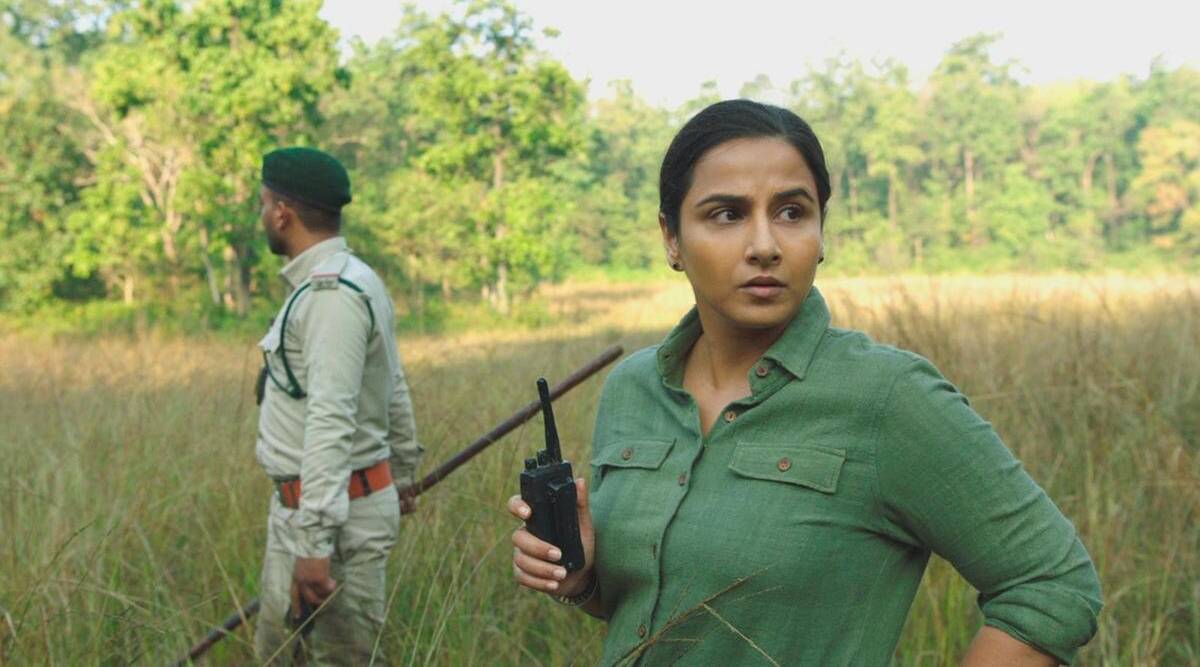Sherni documents the man vs wild conflict, and is also a metaphor for the deep-rooted patriarchy in society
A man mimics a tiger – in the opening shot of Sherni. The so-called “social animal”, as we humans are often referred to, seems to take the role of the “wild animals.” In this man vs wild conflict drama, one wonders who’s the predator and whose being preyed?
Filmmaker Amit Masurkar of Newton fame is back with another satirical social drama. This time, along with issues like politics and conflict, patriarchy also finds its voice. And that’s why we have Vidya Balan as the protagonist – not your quintessential flagbearer of women empowerment this time, rather a subtler and internalised version of the same.
Balan plays Vidya Vincent, a Forest Divisional Officer who has been given field duty after six years on the desk. Few weeks into her new job, she starts facing challenges from all nooks and corners. The lackadaisical attitude of her boss Bansal (played by Brijendra Kala) and other colleagues seem to disturb her, but she neither revolts nor rebukes. Yet, stands her ground, even when the tides go against her.
The story revolves around a tigress, who seems to create a menace for the habitants of the forest – injuring and killing people. The Forest Department’s plan to entrap the big cat on the run goes awry when politics and power play comes into the scene.
Vidya wants to cause no harm to the tigress – intending to set her free in the nearby National Park. Yet, the restless and embittered inhabitants cause a ruckus, and rightly so – given the years of mistreatment they’ve faced. Vidya lends an ear, and the issues that come up stir her from the inside, and she genuinely feels the need to help them, unlike her colleagues. However, zoology professor Hassan Noorani (played by Vijay Raaz) is an exception.
Hassan too genuinely cares for the wild, as well as the inhabitants’ welfare. But the rules of the jungle, the one where humans reside, has no place for people like Vidya and Hassan it seems. And as the film progresses, it gets clearer.
Politicians uphold their own agenda, using the tigress issue as a mere bait. Hunter Ranjan Rajhans (played by Sharat Saxena) is the biggest obstacle in Vidya’s path to save the tigress from a dismal fate. Her senior Nangia (played by Neeraj Kabi), who initially appears to be different from her other colleagues, turns out to be just as, or more, corrupted.
A strong, independent woman like Vidya, amid all other obstacles, becomes the victim of patriarchy from the very beginning. From being termed as ‘a “lady officer’ who has been sent to handle a tough conflict’, to being snubbed many times by seniors – she faces it all. When things spiral out of control, and none of which was Vidya’s fault, the charge of the operation goes to Nangia. ‘A “man” takes charge, then things will definitely be better’ – though those men don’t say it out loud, but it’s evident from their actions.
But it’s not just in the workplace that she faces these issues, even at home she becomes the object of questions like motherhood, how a woman should dress and so on. Her husband Pawan (played by Mukul Chadda) too seems to be unaware of her inner conflicts, or even if aware – seems nonchalant about it, as he still views her as that same “college girl.” To which Vidya firmly opposes, she’s not that girl anymore.
There’s the tigress on the run who feels trapped and helpless – as she’s surrounded by predators or hunters, trying to take away her freedom, or life if possible. And there’s another tigress who feels the same – Vidya’s helplessness amid the ugly faces of power, politics and patriarchy is palpable, yet she roars and keeps forging ahead. Thus, the film, apart from being a documentation of the man vs wild conflict, also appears to be a metaphor of the deep-rooted patriarchy, where women fall prey to the society.
Balan’s performance as the resilient officer, a woman of few words and a highly moralistic, determined individual shines in Sherni. She uses her expressions to convey anger, disappointment and sorrow – all in such a subtle and internalized manner that’s seldom seen in a Bollywood commercial film. Her talent as an actor, seems to have come full circle with her impressionable, authentic depiction of Vidya Vincent.
Apart from Balan, her co-actors – be it Raaz, Saxena or Kala – all these seasoned, talented actors have yet again given noteworthy performances. The film, set against the backdrop of lush forests in Madhya Pradesh, offers a visual treat. The film proceeds with a slow pace, and appears to stretch some of the scenes far more than it should have, but keeps the audience hooked till the end.
Masurkar makes some bold social statements with Sherni – without resorting to the rumblings of the typical Bollywood drama. He does so subtly, and yet the roars are loud and clear.
(Sherni is now streaming on Amazon Prime Video)




